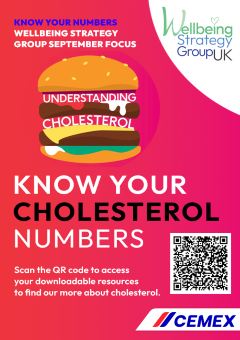This month our Wellbeing focus is Know Your Numbers.  During September we will be sharing information and resources about blood pressure, cholesterol, balanced nutrition, and alcohol.
During September we will be sharing information and resources about blood pressure, cholesterol, balanced nutrition, and alcohol.
This week our focus is Cholesterol. Do you know what Cholesterol is and what your Cholesterol levels are?
We have shared some resources to support this week’s theme, on the UK News download page here. Please share them on your workplace notice boards.
Cholesterol is a fatty substance found in your blood. It is essential for your body to function properly, but too much cholesterol can increase your risk of heart disease and stroke. Cholesterol is required to build cell walls and to make hormones and vitamin D. Some of our cholesterol comes from the food we eat but most is made in the liver. When broken down cholesterol is used to make bile acids which help us to digest our food.
There are two main types of cholesterol: low-density lipoprotein (LDL) and high-density lipoprotein (HDL). LDL cholesterol is often called “bad” cholesterol because it can build up in your arteries and block blood flow. HDL cholesterol is often called “good” cholesterol because it helps to remove LDL cholesterol from your blood.
The ideal levels of cholesterol for adults in the UK are:
- Total cholesterol: 5mmol/L or below
- LDL cholesterol: 3mmol/L or below
- HDL (good) cholesterol: Women naturally have higher HDL cholesterol levels than men due to differences in the genes. Women should aim for an HDL cholesterol level above 1.2mmol/L while men should aim for above 1mmol/L
- Non-HDL (bad) cholesterol (total cholesterol minus HDL cholesterol): 4mmol/L or below
If your cholesterol levels are high, you can lower them by making changes to your diet and lifestyle.
These changes could include:
- Eating a healthy diet that is low in saturated fat, trans fat, and cholesterol.
- Exercising regularly.
- Losing weight if you are overweight or obese.
- Not smoking.
- Limiting alcohol intake.
There are several things you can do to keep your cholesterol levels healthy:
- Get regular cholesterol checks.
- Eat a healthy diet.
-
- This includes eating plenty of fruits, vegetables, and whole grains. It also means limiting your intake of saturated fat, trans fat, and cholesterol.
- Choose lean meats and poultry.
- Trim all visible fat from meat.
- Bake, grill, or roast your food instead of frying it.
- Use vegetable oils instead of butter or margarine.
- Read food labels carefully and choose foods that are low in saturated fat, trans fat, and cholesterol.
- Exercise regularly. Aim for at least 30 minutes of moderate-intensity exercise most days of the week.
- Lose weight if you are overweight or obese.
- Don’t smoke.
- Limit alcohol intake.
If you have high cholesterol, talk to your doctor about how to lower your levels. With lifestyle changes and, if necessary, medication, you can keep your cholesterol levels healthy and reduce your risk of heart disease and stroke.
Women may also find their cholesterol levels rise during the menopause. Read more about this here.
If you would like to know more about cholesterol we have shared some resources for you to download and read here and you can also check out the following resources online:
- NHS website here: https://www.nhs.uk/conditions/high-cholesterol/cholesterol-levels/
- HeartUK website here: https://www.heartuk.org.uk/cholesterol/understanding-your-cholesterol-test-results-
- British Heart Foundation website here: https://www.bhf.org.uk/informationsupport/risk-factors/high-cholesterol
